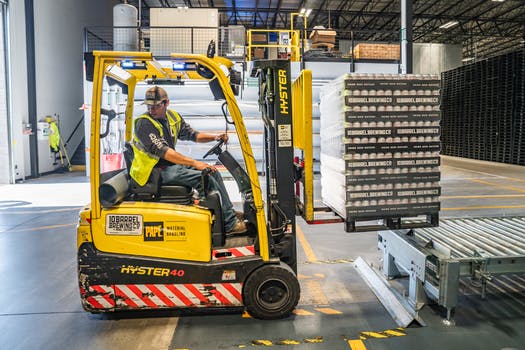How To Start A Storage Business
“Unlock the potential of storage with our step-by-step guide.”
Introduction
Starting a storage business can be a lucrative venture for entrepreneurs looking to invest in the real estate industry. With the increasing demand for storage space, there is a growing need for storage facilities that can cater to the needs of individuals and businesses. In this guide, we will discuss the steps involved in starting a storage business, including market research, location selection, financing, and marketing strategies. By following these steps, you can establish a successful storage business that meets the needs of your customers and generates a steady stream of income.
Finding the Right Location for Your Storage Business
Starting a storage business can be a lucrative venture, but it requires careful planning and execution. One of the most important aspects of starting a storage business is finding the right location. The location of your storage facility can make or break your business, so it’s important to choose wisely.
The first step in finding the right location for your storage business is to research the market. Look at the demand for storage facilities in your area and determine if there is a need for another facility. You can do this by conducting surveys or talking to local real estate agents. If there is a high demand for storage facilities in your area, then you may have found a good location.
Once you have determined that there is a need for a storage facility in your area, the next step is to look for a suitable location. Look for a location that is easily accessible and visible to potential customers. A location near a major highway or busy intersection can be ideal. You should also consider the size of the property and the amount of space available for storage units.
Another important factor to consider when choosing a location for your storage business is the zoning laws in your area. Make sure that the property you choose is zoned for commercial use and that there are no restrictions on the type of business you can operate. You should also check with local authorities to ensure that there are no environmental or safety concerns with the property.
Once you have found a suitable location, it’s important to consider the competition in the area. Look at the other storage facilities in the area and determine what they offer and how much they charge. You should also consider the level of customer service they provide and how you can differentiate your business from theirs.
When choosing a location for your storage business, it’s also important to consider the cost of the property. Look at the purchase price or rental cost of the property and determine if it fits within your budget. You should also consider the cost of any renovations or improvements that may be necessary to make the property suitable for a storage facility.
In addition to the cost of the property, you should also consider the ongoing expenses of running a storage business. This includes the cost of utilities, insurance, and maintenance. Make sure that you factor in these expenses when determining the overall cost of the property.
Finally, it’s important to consider the long-term potential of the location. Look at the growth potential of the area and determine if there is room for expansion in the future. You should also consider the potential for future development in the area and how it may impact your business.
In conclusion, finding the right location for your storage business is crucial to its success. Research the market, look for a suitable location, consider the competition, factor in the cost, and consider the long-term potential of the location. With careful planning and execution, you can find the perfect location for your storage business and start building a successful venture.
Creating a Business Plan for Your Storage Business

Starting a storage business can be a lucrative venture, but it requires careful planning and execution. One of the most important steps in starting a storage business is creating a business plan. A business plan is a roadmap that outlines your goals, strategies, and financial projections for your business. In this article, we will discuss the key elements of a storage business plan and how to create one.
1. Executive Summary
The executive summary is the first section of your business plan and should provide a brief overview of your storage business. It should include your business name, location, mission statement, and a summary of your products and services. This section should also highlight your target market and competitive advantage.
2. Company Description
The company description section should provide a more detailed overview of your storage business. It should include information about your business structure, ownership, and management team. This section should also describe your storage facility, including the size, location, and amenities.
3. Market Analysis
The market analysis section should provide an in-depth analysis of your target market. It should include information about the demand for storage services in your area, your competition, and your target customer demographics. This section should also include a SWOT analysis, which identifies your business’s strengths, weaknesses, opportunities, and threats.
4. Products and Services
The products and services section should describe the storage services you offer. This section should include information about the types of storage units you offer, the sizes, and the pricing. It should also describe any additional services you offer, such as climate-controlled units or moving services.
5. Marketing and Sales Strategies
The marketing and sales strategies section should describe how you plan to promote and sell your storage services. This section should include information about your advertising and promotional strategies, as well as your sales tactics. It should also describe how you plan to measure the success of your marketing and sales efforts.
6. Financial Projections
The financial projections section should provide an overview of your storage business’s financial performance. It should include information about your startup costs, revenue projections, and operating expenses. This section should also include a break-even analysis, which identifies the point at which your business will become profitable.
7. Funding Requirements
The funding requirements section should describe how much money you need to start and operate your storage business. It should include information about your startup costs, operating expenses, and any additional funding you may need. This section should also describe how you plan to use the funding you receive.
Creating a business plan for your storage business is essential for success. It provides a roadmap for your business and helps you identify potential challenges and opportunities. When creating your business plan, be sure to research your target market, competition, and industry trends. Use this information to develop a comprehensive plan that outlines your goals, strategies, and financial projections. With a solid business plan in place, you’ll be well on your way to starting a successful storage business.
Choosing the Right Storage Units for Your Business
Starting a storage business can be a lucrative venture, but it requires careful planning and consideration. One of the most important decisions you will make is choosing the right storage units for your business. In this article, we will discuss some key factors to consider when selecting storage units for your storage business.
First and foremost, you need to determine the size of the storage units you will need. This will depend on the types of items your customers will be storing. If you plan to cater to businesses, you may need larger units to accommodate equipment and inventory. On the other hand, if you plan to cater to individuals, smaller units may be sufficient for storing household items and personal belongings.
Another important factor to consider is the location of your storage units. Ideally, you want to choose a location that is easily accessible for your customers. This means selecting a location that is close to major highways or thoroughfares, and that has ample parking and loading areas. Additionally, you may want to consider a location that is visible from the road, as this can help attract potential customers.
When selecting storage units, it is also important to consider the security features that are available. Your customers will want to know that their belongings are safe and secure while in storage. Look for units that have sturdy locks, surveillance cameras, and security gates. You may also want to consider hiring a security guard or installing an alarm system for added protection.
In addition to security features, you should also consider the condition of the storage units. Make sure that the units are clean, dry, and free from pests. You may also want to consider units that have climate control, especially if you live in an area with extreme temperatures or high humidity.
Finally, you should consider the cost of the storage units. You want to choose units that are affordable for your customers, but that also provide a reasonable profit margin for your business. Consider the rental rates of other storage facilities in your area, and try to price your units competitively.
In conclusion, choosing the right storage units for your storage business is a critical decision that requires careful consideration. You need to determine the size of the units, the location, the security features, the condition, and the cost. By taking the time to research your options and make informed decisions, you can set your storage business up for success.
Marketing Your Storage Business to Potential Customers
Starting a storage business can be a lucrative venture, but it requires careful planning and execution. Once you have secured a location, set up your facility, and established your pricing and policies, it’s time to start marketing your business to potential customers. Here are some tips on how to effectively market your storage business.
First and foremost, you need to identify your target market. Who are the people or businesses that are most likely to need storage space? Are they homeowners who are downsizing or renovating their homes? Are they college students who need a place to store their belongings during the summer break? Are they small businesses that need extra space for inventory or equipment? Once you have identified your target market, you can tailor your marketing efforts to reach them.
One effective way to market your storage business is through online advertising. You can use Google AdWords or Facebook Ads to target people in your local area who are searching for storage solutions. You can also create a website for your business and optimize it for search engines so that people can easily find you when they search for storage options in your area.
Another way to market your storage business is through local advertising. You can place ads in local newspapers, magazines, or on billboards. You can also distribute flyers or brochures in your local community, such as at community events or in local businesses. Make sure your advertising materials clearly communicate the benefits of your storage facility, such as its security features, accessibility, and affordability.
Word-of-mouth marketing is also a powerful tool for promoting your storage business. Encourage your satisfied customers to refer their friends and family to your facility. You can offer incentives, such as a discount on their next rental or a free month of storage, to customers who refer new business to you. You can also ask your customers to leave reviews of your facility on online review sites, such as Yelp or Google My Business, to help build your online reputation.
Social media is another effective way to market your storage business. You can create a Facebook page for your business and post updates about your facility, such as new features or special promotions. You can also use social media to engage with your customers and respond to their questions or concerns. By building a strong social media presence, you can increase your visibility and attract new customers to your facility.
Finally, don’t forget about traditional marketing methods, such as direct mail or door-to-door marketing. You can send postcards or letters to people in your local area who may be in need of storage space. You can also go door-to-door in your local community and introduce yourself and your business to potential customers. By taking a personal approach, you can build trust and establish a relationship with your customers.
In conclusion, marketing your storage business requires a multi-faceted approach. By identifying your target market, using online and offline advertising, leveraging word-of-mouth marketing, and building a strong social media presence, you can attract new customers to your facility and grow your business. Remember to always communicate the benefits of your facility and provide excellent customer service to ensure that your customers are satisfied and loyal.
Managing Your Storage Business Finances and Operations
Starting a storage business can be a lucrative venture, but it requires careful planning and management. In addition to finding a suitable location and securing the necessary permits and licenses, you’ll need to manage your finances and operations effectively to ensure the success of your business. Here are some tips on how to manage your storage business finances and operations.
1. Create a Business Plan
Before you start your storage business, you need to create a business plan. This plan should outline your goals, target market, marketing strategies, financial projections, and operational procedures. A well-written business plan will help you secure funding, attract customers, and guide your decision-making process.
2. Secure Funding
Starting a storage business requires a significant amount of capital. You’ll need to purchase or lease a property, build or renovate storage units, and purchase equipment and supplies. You may also need to hire employees and pay for marketing and advertising expenses. Consider applying for a small business loan or seeking investors to help fund your business.
3. Set Competitive Prices
Pricing is a critical factor in the success of your storage business. You’ll need to set competitive prices that are attractive to customers while still allowing you to make a profit. Research your competitors’ prices and adjust your rates accordingly. Consider offering discounts or promotions to attract new customers.
4. Manage Your Expenses
To ensure the profitability of your storage business, you need to manage your expenses carefully. Keep track of your expenses, including rent or mortgage payments, utilities, insurance, and maintenance costs. Look for ways to reduce your expenses, such as using energy-efficient lighting or purchasing supplies in bulk.
5. Implement Effective Marketing Strategies
Marketing is essential to the success of your storage business. You need to reach out to potential customers and convince them to choose your business over your competitors. Consider using social media, email marketing, and local advertising to promote your business. Offer referral incentives to encourage your existing customers to refer their friends and family.
6. Provide Excellent Customer Service
Customer service is crucial in the storage business. You need to provide a safe, clean, and secure environment for your customers’ belongings. Respond promptly to customer inquiries and complaints. Offer flexible payment options and convenient access to their storage units.
7. Maintain Your Property
Maintaining your property is essential to the success of your storage business. Regularly inspect your property for any damage or security issues. Keep your property clean and well-maintained. Consider investing in security measures such as surveillance cameras and alarms to protect your customers’ belongings.
In conclusion, managing your storage business finances and operations requires careful planning and execution. Create a business plan, secure funding, set competitive prices, manage your expenses, implement effective marketing strategies, provide excellent customer service, and maintain your property. By following these tips, you can ensure the success of your storage business and attract loyal customers.
Conclusion
Starting a storage business requires careful planning and research. It is important to consider factors such as location, competition, target market, and pricing. Developing a solid business plan and obtaining the necessary permits and licenses are also crucial steps. Additionally, investing in quality security measures and providing excellent customer service can help ensure the success of the business. With the right strategy and execution, starting a storage business can be a profitable venture.






